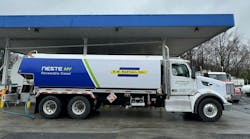MAJORITY Democrats in the House of Representatives barely mustered enough votes to pass the Obama Administration's Jobs for Main Street Act of 2010 (HR 2847). The bill, which includes $39 billion for transportation and infrastructure programs ($27.5 billion of it specifically for highways), was passed along party lines 217 to 212.
All of the Republicans in the House opposed the legislation, and they were joined by 40 Democrats. This would suggest that supporters of the bill may face an uphill struggle in the Senate, which won't begin to consider the measure until sometime in early 2010.
HR 2847 includes an additional extension of the Surface Transportation Extension Act of 2009, a Band-Aid measure passed at the end of September 2009 to continue funding SAFETEA-LU, the highway authorization law that expired last year. The extended highway program would be funded with $53.5 billion until September 2010, giving Congress and the Obama Administration more time to complete a comprehensive highway funding reauthorization bill.
Even with the challenges that lie ahead, the legislation was welcomed by the construction industry. “We applaud the President's readiness to boost infrastructure spending,” says John Horsley, executive director of the American Association of State Highway and Transportation Officials (AASHTO). “By putting additional federal dollars into transportation, the President and the Congress will enable states to continue to make improvements that will have a lasting effect on the health of our communities. With the unemployment rate for construction workers at the alarming rate of 19.4% in November (2009), targeting construction jobs is sure to meet an enormous need.”
Horsley points out that state transportation departments have identified 9,500 highway, bridge, transit, port, rail, and aviation projects worth more than $69 billion that, if funded, can be used to create hundreds of thousands of jobs across the country. The state survey was announced in early December 2009.
“State departments of transportation have proven that these ‘ready-to-go’ projects are a great way to put people back work quickly and efficiently,” he says. “We're dedicated to getting these projects out to bid fast, but we're also committed to making certain that every taxpayer dollar is spent wisely.”
Ready-to-go means a project can move through the federal approval process within 120 days of enactment of authorizing legislation, thus enabling the state to proceed toward construction. The report on ready-to-go projects is based on responses from 50 states and the District of Columbia, and includes 7,497 highway projects valued at more than $47 billion, and 2,091 transit, rail, port, aviation, and intermodal projects valued at more than $22 billion.
“We hope Congress will use this survey to make the case that investment in transportation infrastructure projects are guaranteed to create jobs,” Horsley says. “A bright spot of the economic recovery act continues to be state transportation projects that are pumping billions of dollars into households and businesses while fixing our broken transportation network.”
As of November 20, 2009, 10,600 transportation projects worth more than $30 billion had been approved for funding under the American Recovery and Reinvestment Act. Of the 9,300 highway construction projects authorized in 2009, more than half — 5,458 projects — were either under construction or had already been completed. Three-hundred fifty-five projects approved under the airport grants program and worth $1.08 billion were underway or had been completed. Of the $8.4 billion provided for transit, approval to proceed has been received for 690 grants valued at $7.19 billion. Thousands of buses and railcars have been ordered and are being assembled.
This special Bulk Transporter report on construction is a joint project involving Concrete Products, and Cement Americas, both sister publications of Bulk Transporter.








